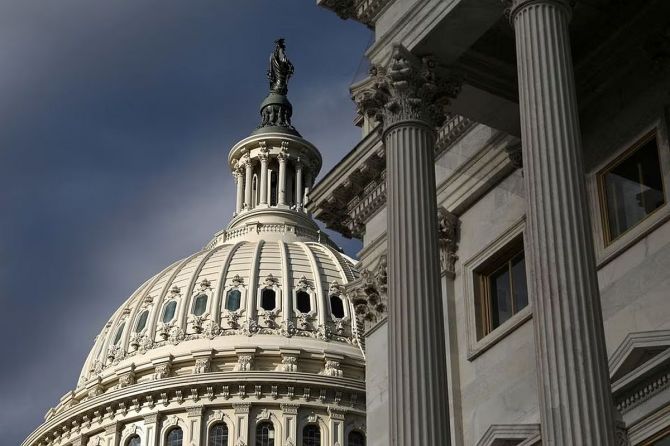Rating agency Fitch recently downgraded the US government's top credit rating to AA+ from AAA, citing fiscal deterioration over the next three years and repeated debt ceiling negotiations.

The development caused a flutter across equity markets, with most leading frontline global equity indices trading weak.
Back home, the S&P BSE Sensex and the Nifty50 lost over 1 per cent each in intra-day deals to hit a low of 65,751.53 and 19,517.55 levels, respectively.
The development, according to Andrew Holland, chief executive officer, Avendus Capital Public Markets Alternate Strategies, is a 'bolt from the blue' and the markets were not expecting this at all at the current juncture.
"The downgrade of US credit will have more implications for the debt/bond markets.
"The yield on the treasury is likely to rise going ahead. Investors will sell equities and move to safe-haven assets. It can trigger a risk-off trade for some time," Holland said.
Bond markets, too, felt the heat with the US yields on the benchmark 10-year bond surging to over 4 per cent.
The US dollar index also moved up to around 102 levels.
Fitch's downgrade comes two months after President Joe Biden and the Republican-controlled House of Representatives reached a debt ceiling agreement that lifted the government's $31.4 trillion borrowing limit.
“In Fitch's view, there has been a steady deterioration in standards of governance over the last 20 years, including on fiscal and debt matters, notwithstanding the June bipartisan agreement to suspend the debt limit until January 2025,” Fitch said in a statement.
Meanwhile, those at Rabobank International, too, are surprised by the downgrade and suggest that the fiscal deterioration in the US has been going on for years.
The expansive fiscal policy during the pandemic, they said, made the debt trajectory even worse.
Governance has also been a problem for years and the most recent debt limit episode, according to them, actually showed a constructive approach by the House Republicans.
“The timing of this downgrade seems a bit random. This could increase the pressure on Moody’s to follow suit, but it may prefer a good reason and wait for a specific incident.
"The Fitch downgrade, meanwhile, could have implications for index trackers and investment funds with AAA only mandate, which could lead to forced sales. But for now, markets remain sanguine about the downgrade,” wrote Philip Marey, senior US strategist at Rabobank International in a note.
Fitch's downgrade comes two months after President Joe Biden and the Republican-controlled House of Representatives reached a debt ceiling agreement that lifted the government's $31.4 trillion borrowing limit.
"In Fitch's view, there has been a steady deterioration in standards of governance over the last 20 years, including on fiscal and debt matters, notwithstanding the June bipartisan agreement to suspend the debt limit until January 2025," Fitch said in a statement.
As regards key levels for Nifty50, Santosh Meena, head of research at Swastika Investmart suggests investors keep a tab on the 20-day moving average, which will serve as a key indicator for how the markets are likely to play out in the near-to-medium term.
Foreign Institutional Investors (FIIs) too, he said, have turned net sellers in the past few days, which indicates some degree of nervousness.
"The recent downgrade of the US rating by Fitch may have a minor impact on the Indian market.
"Nevertheless, it could provide an opportunity for some investors to take profits, leading to a possible pullback.
"Signs of exhaustion are evident at higher market levels, following a strong rally from the March lows.
"If the Nifty50 begins to trade below its 20-Day Moving Average (20-DMA) around 19,600, it might experience further decline toward 19,300 and then towards 18,888 levels," Meena said.











